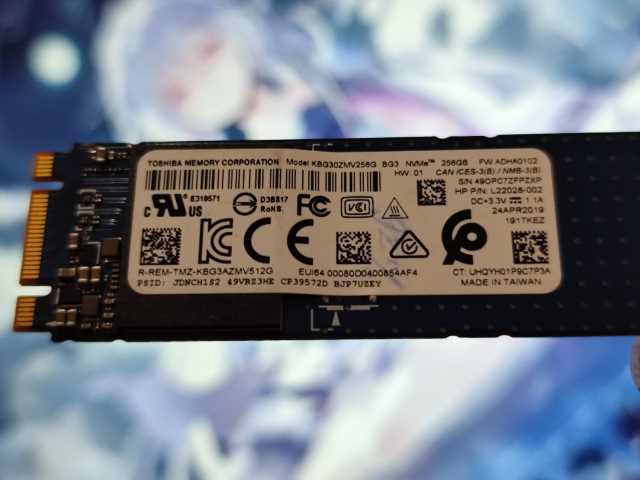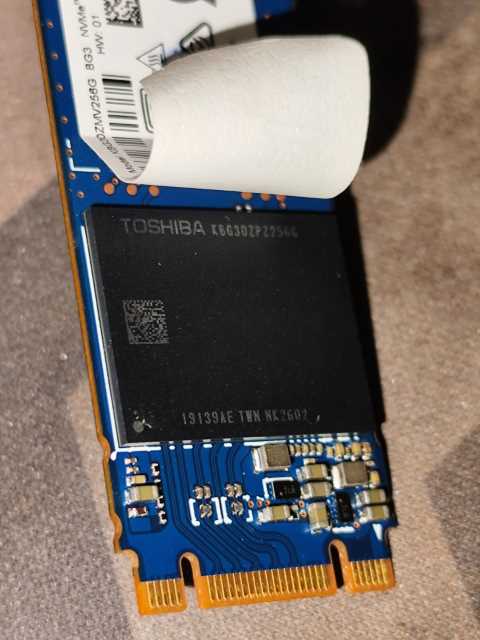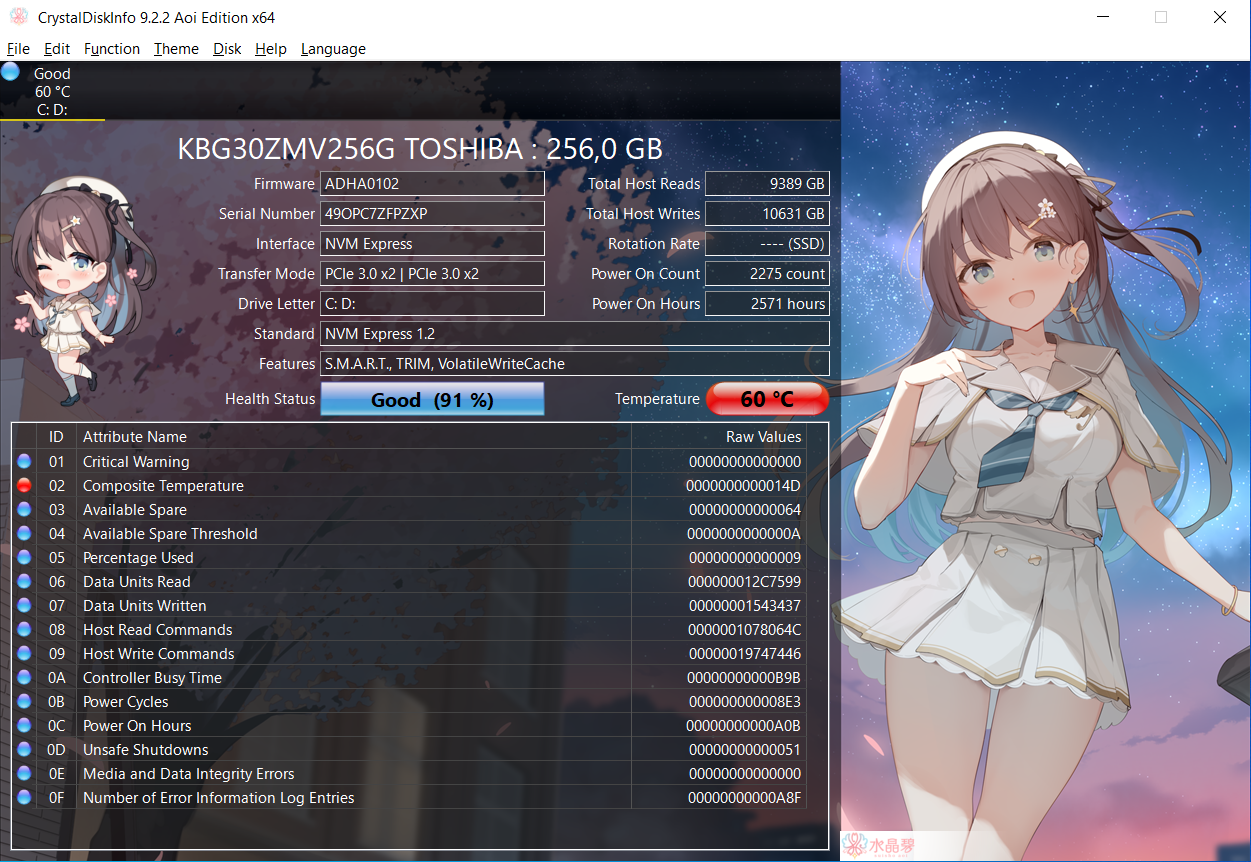Comparing: Sony Vaio 4GB / SMI USB DISK vs TOSHIBA KBG30ZMV256G
In this comparison, we analyze two Disks: Sony Vaio 4GB / SMI USB DISK and TOSHIBA KBG30ZMV256G, using synthetic benchmark tests to evaluate their overall performance. This side-by-side comparison helps users understand which hardware delivers better value, speed, and efficiency based on standardized testing. Whether you're building a new system or upgrading an existing one, this benchmark-driven evaluation offers valuable insights to guide your decision.

Sony Vaio 4GB / SMI USB DISK
| Type: | Disks |
|---|---|
| Model: | Sony Vaio 4GB / SMI USB DISK |
| Capacity: | 4GB |
| Interface: | USB 2.0 |

TOSHIBA KBG30ZMV256G
| Type: | Disks |
|---|---|
| Model: | KBG30ZMV256G |
| Capacity: | 256GB |
| Interface: | PCIe 3.0 x2 |
Specification Comparison Table
This specification comparison presents technical details of several devices or components to help you understand the key differences between each option. Use this table as a reference to determine which device best suits your needs.
| Specification | Sony Vaio 4GB / SMI USB DISK | TOSHIBA KBG30ZMV256G |
|---|---|---|
| Brand | Sony / SMI | TOSHIBA |
| Format | USB FlashDrive | SSD M.2 NVMe 2280 |
| Capacity | 4GB | 256GB |
| Interface | USB 2.0 | PCIe 3.0 x2 |
Submission Comparison Table
This submission comparison table displays the number and details of benchmark data submissions from various devices or components. This information helps you understand the performance based on the benchmarks that have been tested, as well as providing an overview of the consistency and popularity of the available benchmark results.
| No. | Benchmark Software | Sony Vaio 4GB / SMI USB DISK | TOSHIBA KBG30ZMV256G |
|---|---|---|---|
| 1 | AS-SSD |
Read: 24.72 MB/s Write: 8.28 MB/s |
Read: 1363.84 MB/s Write: 786.62 MB/s |
| 2 | ATTO Disk Benchmark - 64M |
Read: 26.54 MB/s Write: 8.56 MB/s |
Read: 1000.00 MB/s Write: 589.86 MB/s |
| 3 | Cross Platform Disk Test |
Read: 24.65 MB/s Write: 8.54 MB/s |
Read: 1100.00 MB/s Write: 532.74 MB/s |
| 4 | CrystalDiskMark |
Read: 24.74 MB/s Write: 9.42 MB/s |
Read: 774.69 MB/s Write: 401.20 MB/s |
Submission Comparison Chart
This chart visualizes the benchmark scores comparison between two hardware devices based on submitted data.
Media Gallery
A collection of photos of tested hardware. These images can help you identify the physical form, model, and variant of the hardware in question. These photos are from our own documentation, and if they are not available we may not be able to document them.
About Hardware Sony Vaio 4GB / SMI USB DISK
The Sony Vaio 4GB/SMI USB DISK is a small capacity 4GB flash drive, which is more commonly found in older devices or used for basic purposes such as storing small document files or important file systems. Despite the “Sony Vaio” name, this flash drive actually falls into the unbranded or OEM universal drive category, as there is no official manufacturer that clearly identifies this product.
This flash drive is known as a native capacity fake USB, which means that while it may physically resemble a large capacity, it actually only has 4GB of usable storage space. With such a significant capacity limitation compared to today's standards, this flash drive still has a role to play in specialized applications, such as a lightweight operating system installation media, recovery tool, or as a configuration file store.
Tests were conducted using a Lenovo IdeaPad Slim 3i 14ITL6 device, 12GB DDR4 Dual Channel RAM, Windows 11 22H2 operating system, and a USB 3.1 Gen 1 port. Based on tests with CrystalDiskMark, this flash drive recorded a read speed of 24.74 MB/s and a write speed of 9.42 MB/s, which is low but sufficient for basic use that does not require large amounts of data transfer.
Device Test:
Device: Lenovo IdeaPad Slim 3i 14ITL6
RAM: 12GB DDR4 3200MHz Dual Channel (8+4)
OS: Windows 11 22H2
USB: USB 3.1 Gen 1
Thursday, 16 October 2014 21:44:19 | Update: 1 month ago
About Hardware TOSHIBA KBG30ZMV256G
The TOSHIBA KBG30ZMV256G is a 256GB NVMe solid-state drive (SSD) specifically designed to deliver high performance in modern computing devices such as ultrabooks, thin laptops and space-constrained systems. Sporting an M.2 2280 form factor, this SSD offers an ideal combination of high speed and compact design, making it an excellent choice for users who require fast storage without sacrificing physical space within the device.
It is built with a PCIe Gen3 x2 interface and supports the NVMe 1.3 protocol, which is significantly faster than traditional SATA-based SSDs. Thanks to 3D NAND flash technology, the TOSHIBA KBG30ZMV256G is able to deliver consistent performance and better power efficiency, while extending the lifetime and reliability of the device. This technology also contributes to low power consumption, which is especially important for laptops and mobile devices that rely on battery efficiency.
In tests conducted using a ThinkPad T470 with an Intel Core i5-6300U processor, 8GB of RAM, and Windows 10 22H2 operating system, this SSD performed very well for a variety of daily computing needs. Based on the CrystalDiskMark benchmark, read speeds reached 774.69 MB/s and write speeds of 401.20 MB/s. Tests with the ATTO Disk Benchmark showed read speeds of up to 1000 MB/s and 589.86 MB/s write, while in the AS-SSD Benchmark, read speeds jumped to 1363.84 MB/s and 786.62 MB/s write. These results show that the SSD is capable of handling demanding tasks such as fast booting, large application loads and large file transfers very efficiently.
Overall, the TOSHIBA KBG30ZMV256G is an ideal choice for users who want an NVMe storage upgrade with high speed, low power consumption and a compact design. Suitable for professionals who require consistent performance under high mobility, this SSD also offers added value in terms of energy efficiency and long-term durability. As a product from a reputable brand like Toshiba (now Kioxia), its reliability and quality have been proven in the global market.
Device test (testbed):
Device: ThinkPad T470
CPU: i5-6300U
RAM: 8GB RAM
OS: Windows 10 22H2
Thursday, 10 August 2023 10:15:02 | Update: 1 month ago



